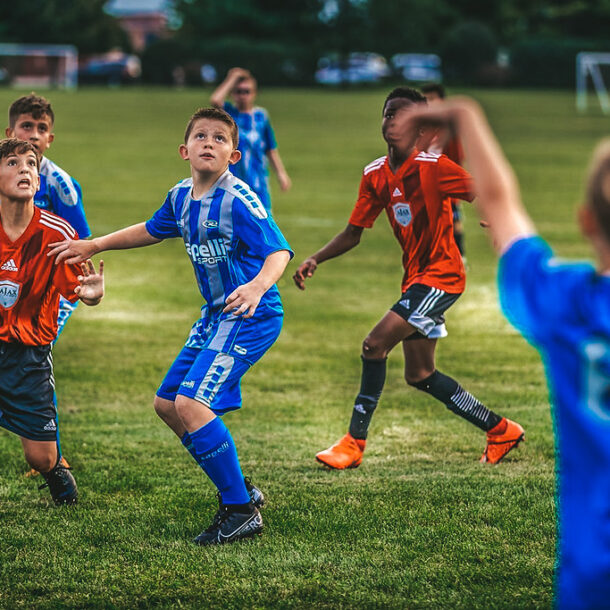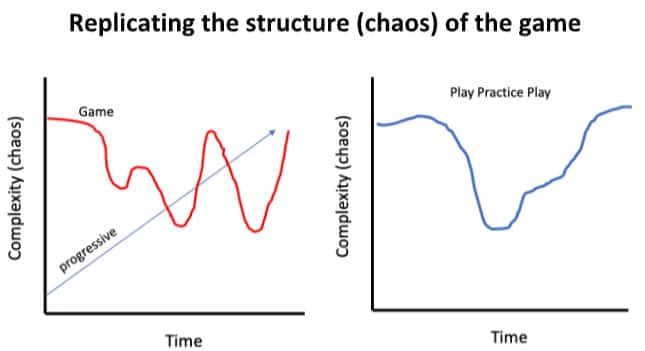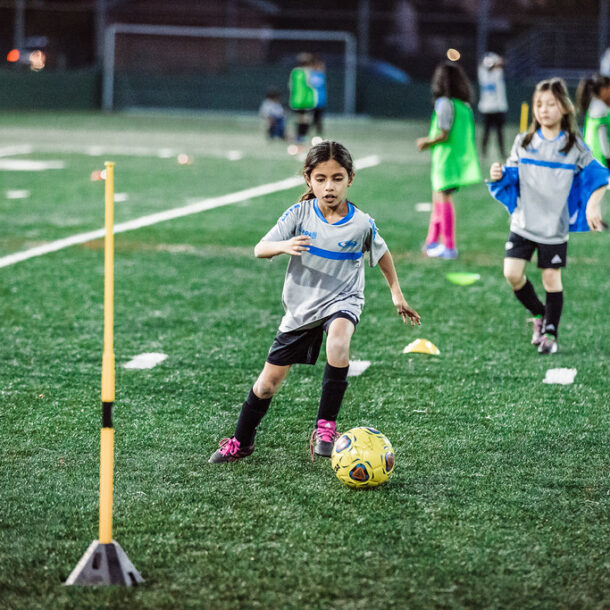
Megan is Rush Soccer’s Coach Education Consultant & Lead on The Rush Female Coaches Alliance.
The single most common question I get working with young players:
“Coach, when are we going to play?”
Why not answer the question before they even have a chance to ask it? Not only will it save the explanation that everything we do at training is actually “playing”, there are also plenty of significant learning and developmental benefits to starting with play (the game). To name a few obvious ones:
- Players are excited to arrive to training.
- No need to wait for stragglers. Players are immediately engaged and can burn off excited energy.
- Coaches can observe to tailor and adjust the session’s coaching points to player needs.
- “Free” play increases opportunities for decision making and creativity similar to street soccer or pickup.
There are also some, in my opinion, more deeply compelling reasons to start a session with some form of play. (Be it 2v2, 4v4, or in this case full 7v7.) I want to share a few that helped shift my firm commitment to progressive sessions into a borderline evangelical belief in starting with the “game”.
Finishing with “success”
Performance and execution is often best at the beginning of a traditional “progressive” session. As activities become more complex, we expect to see more struggle and failure. This can leave young players feeling frustrated as success decreases through the session. Utilizing a “play practice play” or “whole part whole” structure can allow players to experience increased success at the end of a session compared to the initial play phase. The result for young players can be an increased sense of accomplishment and keen awareness of the impact of effective coaching. Players walk to the parking lot feeling like they improved and motivated to return to the training environment.
Increasing the value of coaching

What we know from education research is that people are more likely to tune in and retain information that is immediately useful for them. A quick example:
In February 2020, I knew NOTHING about the importance of incident rates and average test positivity when tracking a virus… let alone how a community achieves herd immunity. The information has always been there, and yet, I found very little reason in the past to give it more than a passing glance. And here I am, a year later, writing COVID-19 protocols for a soccer club.
Players behave the same way. If they are finding mostly success as a task or activity starts simple, they have little reason to tune in and pay attention to coaching. Starting with the game allows coaches to pose questions and point out challenges, allowing players freedom to explore and experience failure. This can make them more likely to pay close attention and work to implement coaching points that could turn their failure into success.
Replicating the structure (chaos) of the game

The most chaotic and complex minutes in soccer games often occur when? The beginning. In my experience, this is especially true with young players as they settle into their positions, navigate relationships with teammates, and take stock of the opponent. A progressive session structure moves from simple to complex and systematically introduces challenge and complexity (i.e. direction, an opponent, etc.). However, we know intuitively this is not how players will experience the game on Saturday. Introducing a scrimmage or play at the beginning of a session can support a player’s ability to jump straight into the chaos and build the habit of working to immediately solve problems. The player’s mental and physical experience throughout the week will more closely mirror what they are likely to experience during the weekend.
In conclusion, there is certainly no one-size-fits-all solution when it comes to developing young people. Increasing the number of tools at our disposal as coaches increases the likelihood we will be able to meet the needs of the players in front of us. Session structure is one of those tools, so regardless of your comfort with play-practice-play, I challenge you to take it for a spin and look for signs of the benefits listed above.











